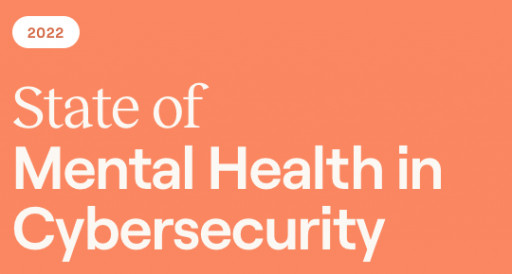DUBLIN, May 12, 2022 (GLOBE NEWSWIRE) -- Tines, a no-code automation platform for security teams, has released the findings from their 'State of Mental Health in Cybersecurity' report to shine light on mental health in the community.
The increased pressures of the past few years, remote work, the talent shortage, job duty frustrations, and other challenges are creating environments where mental health is wearing thin. As May is Mental Health Month, Tines wanted to better understand security practitioners, their daily struggles, how they rank their mental health, and if they're approaching workplace situations and scenarios in healthy ways.
"Prioritizing your team's mental health is more critical now than ever. It not only involves reducing workplace stress, frustrations, and friction that can impact mental health, but also providing the resources and support needed to help your team understand and improve their mental health as well," said Eoin Hinchy, CEO and Co-founder of Tines.
To help further encourage the wider infosec community to take care of their mental health, Tines is committing $25,000 to offer 400 cybersecurity professionals a free 12-month subscription to Headspace, a leading provider of meditation services.
"In my 15 years of being a security practitioner, I saw firsthand how burnout impacted my team," said Hinchy. "We hope by shining a light on mental health through research and providing the opportunity for regular mindfulness sessions, we'll be able to help the security community better address burnout."
Key findings from the report:
- 47% rank their mental health highly. 26% say the state of their mental health is "excellent," while 21% say it's "very good." The remainder rank their mental health as good (20%), fair (15%), or poor (17%).
- 27% say their mental health has declined over the past year. 39% report that their mental health has improved over the past twelve months, and 34% say it has stayed the same. However, 27% report that their mental health has gotten worse over the past twelve months.
- 57% have workplaces that provide mental health support. Nearly two-thirds (57%) of respondents say their workplace provides them with resources and support for their mental health and wellbeing. Yet only 54% say their workplace prioritizes mental health.
- Stress levels are already high — and rising. 66% experience stress at work: 22% are very stressed, 23% are fairly stressed, and 21% are somewhat stressed. Additionally, 63% say their stress levels have risen over the past year.
- Mental health is affecting productivity, and work affects mental health. 64% of respondents say that their mental health affects their ability to get their work done, and 64% say their work impacts their mental health.
- Therapy and medication for mental health is common. 51% of respondents have been prescribed medication for their mental health, and of those, 58% are currently taking medication for their mental health. Additionally, 49% are currently seeing a therapist.
- Half are in good physical health. 50% reported that they're in excellent physical health (26%) or very good physical health (25%). 42% are getting the recommended eight hours of sleep or more per night.
To access a full copy of the report, please visit: https://www.tines.com/reports/state-of-mental-health-in-cybersecurity/
For more information on Tines, visit: https://www.tines.com/
Headspace subscriptions are assigned on a first-come, first-served basis. No individual's information will be used for marketing, sales, or any other outreach.
Media Contact
Holly Hitchcock
Related Images

Image 1: State of Mental Health in Cybersecurity
This content was issued through the press release distribution service at Newswire.com.
Attachment
